| December 2019 Edition |
View in browser | Print |
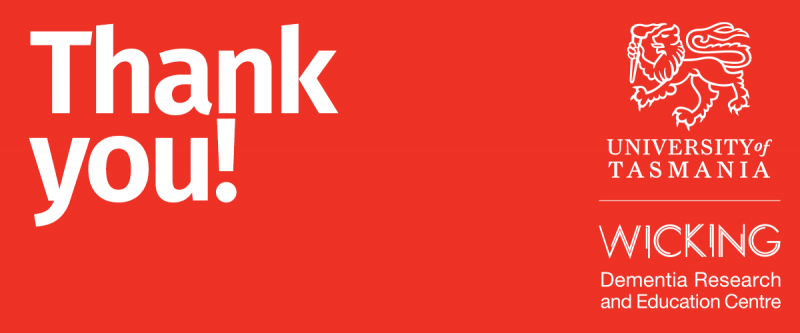 | | Welcome | 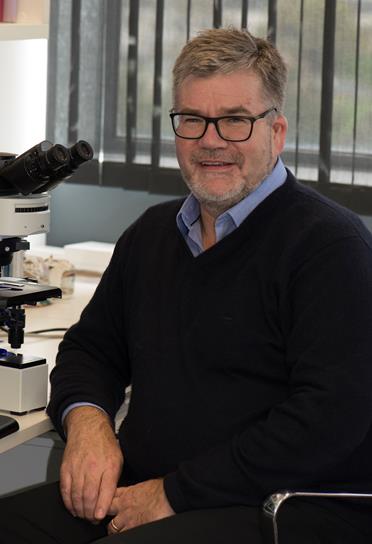
There are some landmark large numbers that we celebrate with this edition of the newsletter. This includes passing over 300,000 enrolments for the MOOCs as well as over 1000 graduates from our formal degree courses. We are very grateful to all who have been involved in these educational offerings – MOOC and course alumni are clearly the champions for those with dementia, and will lead changes in views about dementia in the community and will contribute to transforming approaches to care. This year, we have spent some time writing submissions to the Royal Commission into Aged Care Quality and Safety, and we have met a number of political leaders. It is our view that we need a workforce that has the best preparation for dementia care, and that dementia care specialists need to become part of the fabric of both community-based and residential aged care. Since 2013, we have also heard many stories from participants on the value of the Understanding Dementia MOOC for aged care staff, be they nurses, support workers, ancillary services staff, administrators or board members. Due to the support of the J.O. and J.R. Wicking Trust, we are able to offer this course for free until the end of 2022. Our research published through 2019 shows that this course lifts dementia knowledge to where it should be for those engaged in providing care. This is a highly accessible tool that could be applied throughout the Australian aged care system if there is the political will to support this. Leading into 2020, I would ask that you consider how you may be able to help us make this dementia knowledge boost happen across Australia, perhaps by writing to the Royal Commission, political leaders involved in making decisions about aged care, or to your local member about encouraging everyone in aged care to undertake the MOOC, and to support aged care professionals to upskill with dementia care qualifications. With thanks for your support through 2019 and best wishes for 2020!
|  | | Our Community |
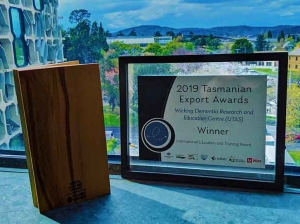 |  | 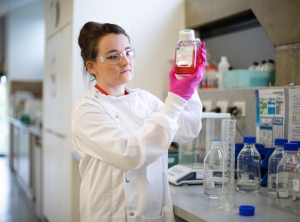 |
Centre's global excellence recognised | We’ve hit over 1000 Graduates! | L'Oréal-UNESCO for Women in Science |
The Wicking Dementia Centre has again been recognised for its global excellence in providing dementia education by winning the International Education and Training category in the 2019 Tasmanian Export Awards. Read more | Congratulations to our 144 December graduates from the Dementia Care Degree Program. Since its inception in 2013, 1092 students have graduated. We congratulate all our graduates and look forward to hearing your stories about how education and knowledge has impacted your role and your workplace. Read more | Wicking Dementia Centre PhD candidate Olivia Holloway is one of four Australians selected for this year's L'Oréal-UNESCO for Women in Science Mentoring Program. A tremendous opportunity for one of our PhD students – congratulations Olivia. Read more |
|
| Our Education |
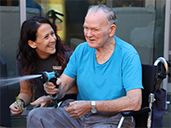 | 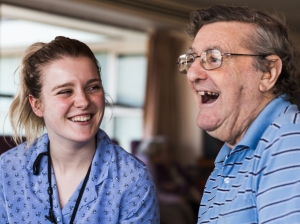 |  |
Diploma of Dementia Care – open to all | MOOC enrolment – a new goal! | Experiences of a Bachelor of Dementia Care Graduate |
100% HECS Scholarships are available for Australian citizens, with substantial tuition fee discounts for our international students (conditions apply). This eight-unit, online program provides specialist knowledge in direct care to enable best practice dementia care. Applications into the Diploma are now open to start in Semester 1, February 2020. APPLY TODAY | Earlier in the year, we had a goal to reach 300,000 MOOC enrolments by the end of 2019. We have exceeded that goal with total enrolments to date being 317,108 globally. Now is the challenge to surpass our previous target and reach a new goal of 300,000 enrolments within Australia by 2021. Please forward information about our MOOCs to friends, colleagues and family so we can keep improving the knowledge and understanding of dementia. Help us reach our goal | Dragana Bozinovski graduated in 2017 from the Dementia Care Degree Program and has used the knowledge she gained from her studies every day in her working life. She states “So when I say – life changing, you can see why and how the Bachelor of Dementia Care has added to my career path but more to my passion of promoting the dignity and quality of life of people living with dementia and their families.”
Read more |
|
| Our Research |
 | 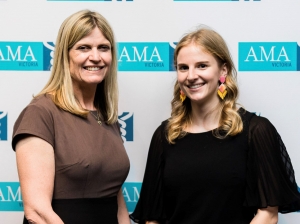 | 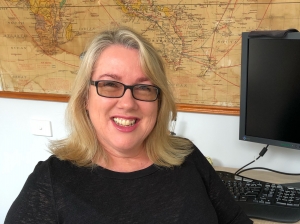 |
The ISLAND Project has begun | Medical Journal of Australia award | Spotlight on Helga Merl |
The ISLAND Project commenced in early October with over 8,500 Tasmanians being invited to participate in our first programs of research. We have had a fantastic response and would like to say thanks everyone – you have joined an active community with the common goal of reducing your own personal risk and the risk of dementia in our community. Read more | Wicking Dementia Centre researcher, Dr Juanita Breen and colleagues, have been awarded the 2018-19 Stawell Prize for her article RedUSe: reducing antipsychotic and benzodiazepine prescribing in residential aged care facilities. Dr Breen has been instrumental to highlighting the overuse of antipsychotic drugs in the aged care system. (Photo with Katherine Franks, research assistant and co-author). Read more | Helga is one of our Lecturers who has recently joined the Wicking Dementia Centre, located in Launceston. She leads the health and social care education in the Master of Dementia, which is helping her work towards her 'fourth five-year plan’ to change the world for people living with dementia. Read more |
|
| News from the Community |
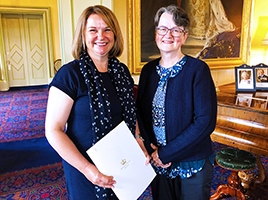 | 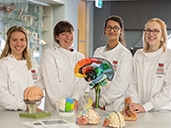 |  |
Florence Nightingale study grant | Bringing neuroscience to our schools | Stress and dementia risk |
We are very proud of our PhD candidate, Helen Gulliver, who has received a substantial grant from the Florence Nightingale Grants and Awards, to support her doctoral research into the impacts of undertaking the Understanding Dementia MOOC for new graduate registered nurses. What a fantastic opportunity for Helen to investigate the benefits of undertaking our UD MOOC. Learn more about our MOOCs | Hear how Wicking Dementia Centre researchers are bringing neuroscience to our schools. The Neuroscience Community Outreach Program (NCOP), aims to engage members of the public in neuroscience and is now tailored for accessibility to primary school children who may otherwise not be exposed to neuroscience. Read more | How do our stressful life experiences impact our brain as we age? Do stressful or traumatic events make us more vulnerable to dementia? Hear how are researchers are investigating this critical area of risk reduction to see how managing stress and building resilience can potentially decrease dementia risk.
Read more |
|
|
Stay connected:
|




|
utas.edu.au/wicking
|
| |
|
|